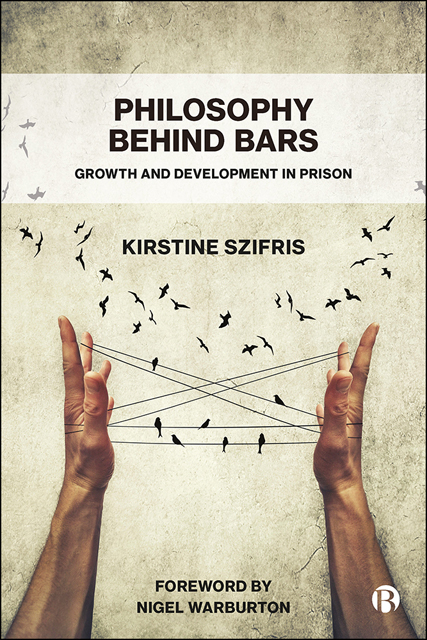Book contents
- Frontmatter
- Dedication
- Contents
- List of Boxes
- Acknowledgements
- Foreword
- 1 Philosophy, Identity and the ‘Ship of Theseus’
- 2 Towards Theory: People, Places and Voices
- 3 Survival, Plato and the Ideal Society
- 4 Kant, Bentham and the Question of Identity
- 5 ‘Why Do You Think That?’ Descartes, Hume and Knowledge>
- 6 Not Just an Offender, But a Person
- 7 Trying to Find a Community of Philosophical Inquiry
- 8 Finding Trust and Developing Relationships
- 9 Personal Self-Exploration
- 10 Towards a Framework for Understanding Philosophy in Prison
- 11 Final Reflections
- Appendix: Technical Methods
- Bibliography
- Index
6 - Not Just an Offender, But a Person
Published online by Cambridge University Press: 15 April 2023
- Frontmatter
- Dedication
- Contents
- List of Boxes
- Acknowledgements
- Foreword
- 1 Philosophy, Identity and the ‘Ship of Theseus’
- 2 Towards Theory: People, Places and Voices
- 3 Survival, Plato and the Ideal Society
- 4 Kant, Bentham and the Question of Identity
- 5 ‘Why Do You Think That?’ Descartes, Hume and Knowledge>
- 6 Not Just an Offender, But a Person
- 7 Trying to Find a Community of Philosophical Inquiry
- 8 Finding Trust and Developing Relationships
- 9 Personal Self-Exploration
- 10 Towards a Framework for Understanding Philosophy in Prison
- 11 Final Reflections
- Appendix: Technical Methods
- Bibliography
- Index
Summary
‘The subjects, I’ve never in my life ever thought about … even the most famous questions, I think therefore I am and all of that lot. Actually knowing where that came from, and the fact that even something that I believe in very strongly can be flipped within a sentence.’ (Phil, Grendon)
Over time, the philosophy classroom became a place for genuine, exploratory conversation. We have seen how, being in HMP Grendon with participants who were already willing and able to engage in conversation in a group setting, establishing the ethos of safe community inquiry proved relatively straightforward. To illustrate this further, I return to the example presented in Chapter 5 that focused on Hume and Arendt's perspectives of identity. In this session, philosophical conversation flowed, conversation was deep and meaningful, and the participants were engaged and insightful.
However, at the end of the session, an incident happened that served to remind me that this was still a prison. Despite the emphasis in Grendon on personal development, on therapy and democracy, I was still working in a restricted environment.
The session on Hume and Arendt in Week 6 proved to be a ‘deep dive’ into the concept of identity and the core self for the men with whom I worked. By this point we had touched on identity through Theseus’ ship, moved to society through Plato, and discussed moral action through Kant, Bentham and Mill. In the previous discussion, we had considered Descartes’ famous phrase Cogito, ergo sum. This time, however, we looked at an alternative perspective of identity, considering the role of identity, experience and culture in shaping not only who we are but also how we perceive ourselves. Further, the work of Arendt, in particular, allowed us to explore the relevance of how others see us, an issue that is of particular relevance to people in prison.
Only three men attended this session. The Open University was hosting an event in the prison at the same time, and several of the participants needed to attend. Despite this, the conversation was rich and insightful. By this point we had been discussing philosophy together for six weeks; we had begun to know each other, and the men had developed a clear understanding of what to expect in the class.
- Type
- Chapter
- Information
- Philosophy behind BarsGrowth and Development in Prison, pp. 99 - 120Publisher: Bristol University PressPrint publication year: 2021



